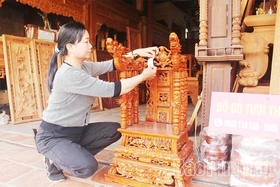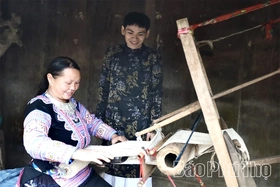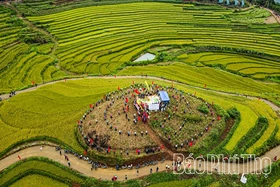{title}
{publish}
{head}
With the desire not only to preserve the cultural space of the ancient Muong people but also to build a high-quality tourism destination rich in ethnic identity, Muong Bi Commune is currently coordinating the implementation of a 1/500 scale Detailed Planning Project for the Muong Ethnic Cultural Space Conservation Area in Luy Ai Hamlet. The project promises to unlock the vast potential of what is considered the spiritual “heart” of Muong land.

The Temple of the Great Mother Hoang Ba in Luy Ai Hamlet hosts the palanquin procession ceremony of the Muong ethnic group’s Opening Festival.
Nestled beside a clear, winding stream and framed by lush rice fields at the foot of majestic mountains, Luy Ai Hamlet (formerly Ai Hamlet, Phong Phu commune) resembles a living landscape painting. More than just a typical Muong village, this area is known as the capital of ancient Muong Bi- where cultural traditions, customs, and the spiritual soul of the Muong people from millennia past remain vividly preserved.
Covering an area of approximately 4.95 hectares, Luy Ai is home to 34 households with 165 residents - all of Muong ethnicity. Its traditional stilt houses cluster closely together, fostering a warm, communal atmosphere. The hamlet’s cultural significance was officially recognized in 2008, when the Ministry of Culture, Sports and Tourism invested in its preservation and designated it a national model ethnic minority village, representing the Muong people across Vietnam.
For decades, Luy Ai has been the site of the Muong Bi Khai Ha Festival, now known as the Muong Ethnic Group’s Khai Ha Festival- a national intangible cultural heritage- which has created a profound cultural imprint, attracting both visitors and researchers alike.
Recognizing this immense cultural value, local authorities have approved a 1/500 scale detailed planning project for the conservation area, covering a total research area of 146.7 hectares. This initiative is a concrete step toward realizing the province’s “Project to Preserve and Promote the Cultural Values of the Muong Ethnic Group and the Hoa Binh Culture for the 2023–2030 Period.”
The project’s vision is not merely to preserve heritage but to merge tradition with modernity- promoting sustainable tourism through community-based, experiential, and high-end ecotourism models. The goal is to establish a modern, well-integrated technical infrastructure, enhance the quality of tourism offerings, and transform Muong Bi into a must-visit cultural destination.
According to the approved plan, a harmonious cultural-tourism complex will be developed, clearly divided into functional zones. At the heart of the project is the Ancient Muong Village Conservation Area, where traditional stilt houses, customs, and the daily life of the Muong people in Luy Ai will be carefully preserved and restored. Complementing this is the Muong Cultural Space Museum, which will showcase artifacts, historical documents, and immersive exhibits that offer visitors a vivid and comprehensive view of Muong heritage.
The Temple of the Great Mother Hoang Ba will provide a solemn spiritual space, meeting the religious needs of both locals and tourists while preserving traditional beliefs. The area dedicated to Muong festivals and cuisine will host major cultural events such as the Khai Ha Festival and feature a culinary space offering authentic Muong dishes. In addition, a high-end ecotourism zone will be developed, with resort facilities designed in the style of traditional stilt houses but equipped with modern amenities. These resorts will be harmoniously integrated into the surrounding natural landscape, offering luxurious yet culturally rich experiences. The entire ecosystem- including forests, streams, and terraced fields- will be preserved and enhanced to create a majestic and refreshing natural backdrop for the entire area.
The entire surrounding ecosystem- including forests, streams, and terraced fields- will be preserved and enhanced to create a majestic, refreshing natural backdrop for the area.
According to Mr. Bui Minh Hong, Vice Chairman of Muong Bi Commune People’s Committee, a detailed implementation roadmap has been outlined: Phase 1 (2025–2027) will focus on developing core infrastructure, including roads, electricity, and water systems, while beginning construction of key components such as the museum, festival grounds, and food court. This phase will also include restoration of ancient Muong houses and construction of reception areas and parking facilities. Phase 2 (2027–2030) will complete and upgrade remaining elements, such as the cultural house, ecological improvements along the stream, and expansion of the temple complex. This phase will prioritize the construction of a new traffic axis connecting to National Highway 6 and Provincial Road 436 and the development of high-end ecotourism services, experiential tourism products, and handicraft trade zones.
The project is not only a government initiative but also a call to action for investors, organizations, and individuals passionate about cultural preservation and sustainable development. This is a golden opportunity to join hands with the local community in realizing a visionary project, where the traditional values of the Muong people are preserved, elevated, and brought to life through responsible, future-oriented tourism.
Huong Lan

baophutho.vn On December 8, 2017, at its 12th session, the UNESCO Intergovernmental Committee for the Safeguarding of Intangible Cultural Heritage...

baophutho.vn Situated in the fertile land of Binh Nguyen (Vinh Phuc), the Huong Canh Communal House Complex — comprising Huong Canh, Ngoc Canh and Tien...

baophutho.vn For generations, whenever people mention Huong Canh Town (former Binh Xuyen District, Vinh Phuc Province), now Binh Nguyen Commune of Phu Tho...

baophutho.vn Kha Cuu Commune was formed by merging three former communes: Dong Cuu, Thuong Cuu, and Kha Cuu, with the Muong ethnic group accounting for over...

baophutho.vn Perched atop Tram Linh Hill, Quoc Te Temple in the former Di Nau Commune — now Tho Van Commune — has long been regarded as a solemn and...

baophutho.vn Located in Giap Lai Commune, this ancient communal house is revered by local residents as the “soul of the Muong village.” It is dedicated to...

baophutho.vn The Thai people are the largest indigenous ethnic group in Mai Chau District, now residing mainly in communes such as Mai Chau, Bao La, Mai Ha,...

baophutho.vn Today, Phu Tho Province is home to hundreds of traditional craft villages — from wood carving, blacksmithing, and bamboo weaving to mechanics,...

baophutho.vn In line with the orientation toward tourism-based economic development, the traditional brocade weaving craft of the Mong ethnic group in Pa Co...

baophutho.vn On the morning of October 25, the opening ceremony of the Mien Doi Terraced Fields Festival 2025 took place in Thuong Coc Commune.